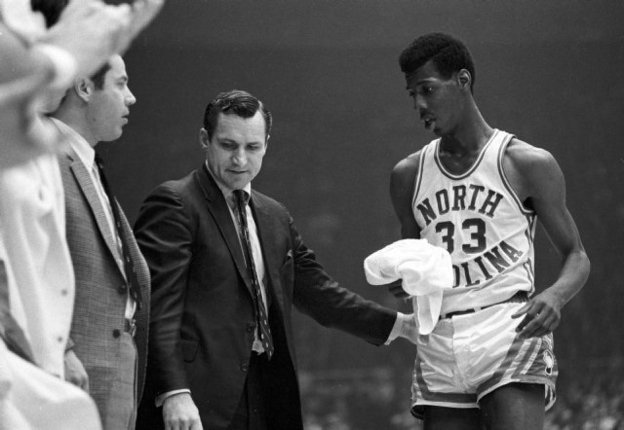For many Americans, Dean Smith is best known as the man who coached Michael Jordan in college. Smith is, quite simply, the man who mentored one of America’s two greatest team-sport athletes from the 20th century, Babe Ruth being the other. (Muhammad Ali, of course, didn’t play a team sport.)
Dean Smith also won 879 games. He won two national championships along the way. Plenty of people know those facts, too.
He won the 1976 Olympic gold medal, and more than that, he won it after the deep and lasting pain of the 1972 Munich experience, one which left lasting scars on U.S.A. Basketball, even though the ending of that game against the Soviet Union was patently unjust.
Again, this is nothing you didn’t already know.
Smith reached 11 Final Fours. That’s fairly common knowledge as well. However, did you know that Smith’s first and last Final Fours are separated by 30 years (1967 and 1997)? Only one other coach has two Final Fours separated by a longer period of time: Ray Meyer of DePaul (1943 and 1979, a 36-year gap).
Smith advanced the four-corner offense.
He is considered by many as the man responsible for bringing advanced basketball stats into being:
Quote-unquote advanced stats would be impossible without the work Dean Smith did more than 50 years ago. He is the founding figure, period.
— John Gasaway (@JohnGasaway) February 8, 2015
(Do read the replies to that tweet by John Gasaway of ESPN Insider, by the way.)
One more basketball note about Dean Smith:
He made 13 straight Sweet 16 appearances, from 1981 through 1993.
The streak seemed likely to end in 1990, when North Carolina dipped to a No. 8 seed in the Midwest Regional, but no — Rick Fox struck down top-seeded Oklahoma in the round of 32 to lift the Tar Heels to the second weekend of the NCAA tournament yet again:
Of all of Smith’s basketball-specific achievements, that’s the one many fans and pundits overlook, the achievement which speaks to high-level consistency more than any other. It’s one of college basketball’s most remarkable records — maybe not as great as Joe DiMaggio’s 56-game hitting streak in Major League Baseball, but close.
Let’s briefly recap what’s been said so far about Dean Smith the basketball coach:
* He mentored Michael Jordan.
* He won multiple national titles.
* He reached double-digit Final Fours encompassing 30 years.
* He claimed Olympic gold at a crucial point in the history of U.S.A. Basketball.
* He revolutionized his sport.
* He revolutionized the way his sport was analyzed, charted, written about, and talked about.
* He forged one of the greatest streaks in his sport’s history… and the larger history of American sports.
Absorb all that. Digest that. Reflect on that. Marvel at that. Wrap your mind around that… if you can.
Drink it in deeply.
Allow the amazement to sink in.
Feel the enormity of one man’s impact on a sport.
Sense the weight of one man’s accomplishments in the cauldron of cutthroat competition.
Realize that Smith achieved richly in a part of the country where basketball is taken very, very seriously, so much that Smith was hung in effigy before he finally broke through as a coach with that 1967 Final Four.
Take it all in. All of it.
Pause.
Breathe deeply.
Then realize that all of these accomplishments as a basketball coach pale in comparison to what Smith achieved off the court, as a powerful force in integrating both the ACC and college basketball itself.
*
Jordan.
National titles.
All the Final Fours and a ridiculous run of Sweet 16s.
A gold medal.
Transforming one’s industry and the way others write about it.
From a strictly professional perspective, this man was as influential as one could possibly comprehend.
That his personal impact on countless lives — on the very fabric of America as this nation once existed — dwarfs his enormous professional achievements tells you all you need to know about Dean Edwards Smith.
This nation hasn’t just lost one of its greatest basketball coaches.
These United States have lost one of their best citizens from a time known as “The American Century.”
